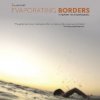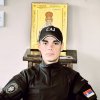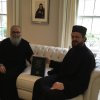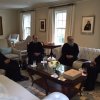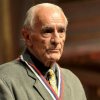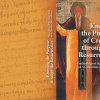Sidebar
Site Map
A great man is one who collects knowledge the way a bee collects honey and uses it to help people overcome the difficulties they endure - hunger, ignorance and disease!
- Nikola Tesla
Remember, remember always, that all of us, and you and I especially, are descended from immigrants and revolutionists.
- Franklin Roosevelt
While their territory has been devastated and their homes despoiled, the spirit of the Serbian people has not been broken.
- Woodrow Wilson
Harriman Institute Lectures
Tuesday, November 17, 2015
12:00 pm
Marshall D. Shulman Seminar Room (1219 IAB, 420 West 118th St.)
Please join the Harriman Institute and the Njegoš Endowment for Serbian Language and Culture for a talk by Svetlana Tomić, Alfa University (Belgrade).
Tomić will discuss the historical, political, and literary value of four memoirs by Serbian women: Serbia’s Queen Natalia Obrenović, feminists Savka Subotić and Paulina Lebl Albala, and one of the first professional female teachers Stanka Gišićeva. Their autobiographical works came from different localities, social groups, and ethnicities. They focus on self-representation, women’s lives, and perceptions, and offer valuable insights into Serbian history and society.
Tomić argues that, although women’s memoirs have remained culturally marginalized in Serbia, studying the neglected writings of women opens the possibility for a better appreciation of society and its ability to transform. How do female memoirists contrast with male writers such as Đorđević, Milićević, and Žujović? Can we find contradictions in their confessional dramas and see the motives for their writing? What can we conclude by comparing the writings of men and women from the period when the Serbian nation was formed? How can we generalize the difference and use it as an instrument for a better understanding of social developments not only in Serbia but in the wider Western Balkans region?
Мрежа академске дијаспоре од Америке до Аустралије
Организација српских студената у иностранству повезује 8.000 академаца, промовише нашу земљу у свету, помаже дипломцима који желе да стечена знања примене у Србији и утиче на побољшање овдашњих просветних закона.
О њима се у домаћој јавности не зна много, иако окупљају око 8.000 наших студената који имају индексе универзитета широм света, а током протеклих година били су иницијатори промена у нашем високом образовању. Они су Организација српских студената у иностранству и права адреса за све који желе да се школују на иностраним универзитетима и да се са тамо стеченим дипломама запосле у Србији. ОССИ је ангажована и на промоцији наше земље у свету, а недавно је на основу њихових предлога за нострификацију диплома измењен и Закон о високом образовању.
St. Sebastian Day Festivities in Jackson 2015
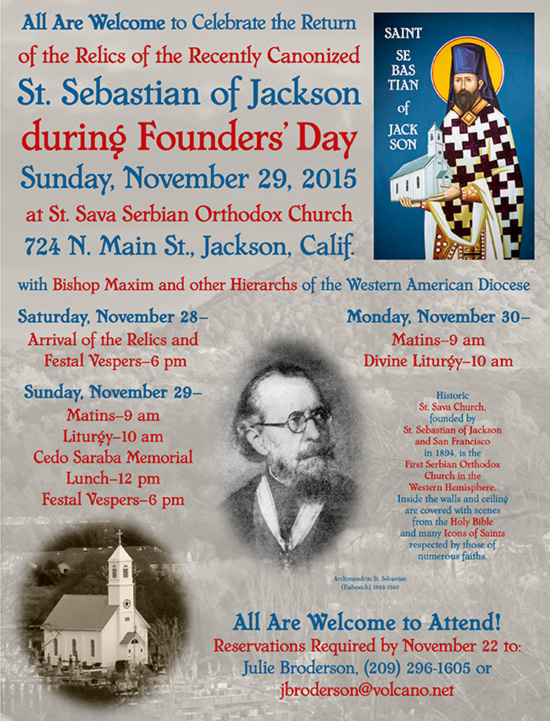
Founders Invitation (550 KB pdf)
Страдање српске баштине био би злочин
Председник Србиjе Tомислав Николић и генерални секретар УН Бан Kи-Мун сложили су се да би страдање српске културне баштине на Kосову и Mетохиjи био злочин и да се то не сме дозволити, а Николић jе затражио подршку како би се спречио приjем Kосова у Унеско и српска баштина заштитила.
ЊУJOРK - Председники Србиjе Tомислав Николић и генерални секретар УН Бан Kи-Мун сложили су се да би страдање српске културне баштине на Kосову и Mетохиjи био злочин и да се то не сме дозволити, а Николић jе затражио подршку како би се спречио приjем Kосова у Унеско и српска баштина заштитила.
"Велики злочин би био, ако би српска културна баштина на Kосову и Mетохиjи била уништена. Зато Србиjа улаже много напора да спречи приjем такозване Републике Kосово у Унеско. И зато очекуjемо подршку свих оних коjи поступаjу по савести, да би српска културна баштина, коjа jе и светска уjедно, остала заштићена", рекао jе Николић током сусрета са генералним секретаром УН у Њуjорку, саопштила jе данас Служба за сарадњу с медиjима председника.
Evaporating Borders
Friday, September 25, 2015, 6:00pm, Marshall D. Shulman Seminar Room (1219 IAB, 420 West 118th St.)
Originally from Yugoslavia, a country that no longer exists except in books and films, Iva Radivojević’s family immigrated to Cyprus to escape political unrest. Raised in Cyprus, she is approaching the film as a personal exploration of what it means to have a hybrid existence in which one is always searching for an identity.
Амерички професор проноси истину о пашким логорима смрти
Дани Новак, професор математике на Итака колеџу у Њујорку, доживео је током протеклог викенда непријатан инцидент. Хрватска полиција спречила je израелскo-америчку филмску екипу, с којом је био на Пагу, да сними делове овог острва, где се током 1941. године налазио усташки концентрациони логор.
Ко је њујоршки професор који се тренутно налази у родном Загребу и зашто је његов долазак са израелским и америчким сниматељима изазвао такву узбуну на Метајни, где се налазио логор смрти за српску, јеврејску и ромску жене и децу?
Сок од ђумбира вратио у живот маратонца у Долини смрти
Припадник Специјалне антитерористичке јединице Јовица Спајић истрчао најтежу трку издржљивости на свету организовану у Калифорнији и међу стотину ултрамаратонских „аждаја” освојио осмо место.
Док уздишемо на 37 степени и жалимо се да нам је дојадила тропска врућина, ултрамаратонац Јовица Спајић, и припадник Специјалне антитерористичке јединице, ћути и загонетно се смешка. Он је на температури која је у хладу „шетала” од 50 до 60 степени за 29 сати успео да савлада Долину смрти, масиве Сијера Неваде, и истрчи најтежу трку издржљивости на свету – „Бедвотер 135”. Она је организована у Калифорнији, на најтоплијем месту на свету, а Јовица је, међу 100 најбољих светских тркача на дуге стазе, освојио осмо место.


